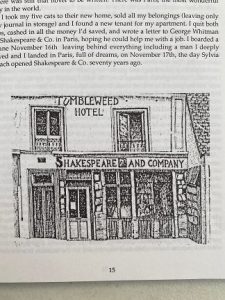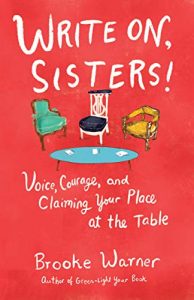Essay by Brooke Warner, Publisher of She Writes Press
Brooke Warner is publisher of She Writes Press, president of Warner Coaching Inc., and author of Write On, Sisters!, Green-light Your Book, What’s Your Book?, and three books on memoir.
We are delighted to feature this wonderful essay by her about her time as a Tumbleweed at Shakespeare & Co. and how that led to her book publishing career.
Tumbling
 There’s a stage of grief that’s little addressed in our culture because from the outside it looks more like self-destruction. It happens when you’re hurting so badly that all you can think to do is hurt yourself, where you push the boundaries because you want to feel something. Anything. A natural response to numbness, perhaps.
There’s a stage of grief that’s little addressed in our culture because from the outside it looks more like self-destruction. It happens when you’re hurting so badly that all you can think to do is hurt yourself, where you push the boundaries because you want to feel something. Anything. A natural response to numbness, perhaps.
This was the state I was in when I arrived at Shakespeare & Co. in the summer of 1999. On the train to Paris I fantasized about starving myself till I became so thin I might float away. The act of making ourselves invisible, I’d later learn, is a common female reaction to pain. My starvation fantasy was one-part strategy. I needed to figure out how to extend my European vacation, or Gap Year, which was the formal label I’d given for what I was doing to friends and family back home. In truth, it was an act of desperation.
I was high on Vicodin on a boat in the middle of the Aegean Sea when I’d heard from some guy that travelers could crash for free at Shakespeare & Co., that the owner, George, was an eccentric old man with a soft spot for travel-weary young people. I’d read the instructions on the pill bottle just before I’d dumped them into a Ziplock bag and shoved it into my carry-on: Do not mix with alcohol. But I’d swallowed the thick blue pill with a swig of vodka anyway and offered one to my new friend.
I was just a month into my travels, having landed first in Madrid, where I’d spent one aching night on my ex-boyfriend’s cousin’s couch. Luis, my ex, had picked me up at the airport. I was self-conscious about the fact that I must have looked like a drunk chipmunk following the very recent invasive dental procedure that had left my face pretty swollen. Luis sped us across town in his parents’ Peugeot.
Less than two months had passed since he’d informed me he was moving back to Spain, for good. We’d been college sweethearts and I was smitten with him—with his very foreignness, his sexy accent, images of our future bilingual children, and our story of having fallen in love when we were freshmen, just eighteen, and how we’d be together forever.
When I suggested I might come with him, his answer was curt. “You can move to Madrid,” he told me, “but you’d have to get your own apartment.” We’d been living together for the past eight months since graduating from college, so this wasn’t exactly a subtle break-up line.
I sat on his cousin’s couch that would be my bed that first evening, laughing a lot, talking with this second or third cousin, our parents’ age, who complimented my Spanish and told Luis how delightful I was. It was intentional, no doubt, my show; I needed Luis to see how happy I was. I wasn’t in Europe for him. This was a vacation, or a Gap Year. Whatever. Never mind that we were ostensibly adults now, that my dad had made a few wise cracks about how happy he was that I’d gotten a prestigious college degree so I could waitress, that I’d sold my car (to my mom) for money for the trip. No, Siree, there was nothing desperate about me showing up in Madrid.
 I was determined to prove to myself that I could and would be okay without Luis, but he was a magnet, and you can buy a cheap ticket to Madrid from any train station in Europe. And I did. We rendezvoused in hostels and a couple times at his new flat that he shared with a roomate. The sex was urgent; any of those encounters might be the last time, after all. I never considered getting my own apartment in Madrid.
I was determined to prove to myself that I could and would be okay without Luis, but he was a magnet, and you can buy a cheap ticket to Madrid from any train station in Europe. And I did. We rendezvoused in hostels and a couple times at his new flat that he shared with a roomate. The sex was urgent; any of those encounters might be the last time, after all. I never considered getting my own apartment in Madrid.
Paris seemed as good a spot as any to land. A romantic city, beautiful, with plenty of travelers just like me passing through. My plan was to get the gig at Shakespeare & Co. and stay a few nights while I figured out what was next. I never imagined I’d stay on for three months.
George, it turned out, was eccentric. On one of my first nights there I walked in on him peeing into a hole in the floor of the upstairs bathroom-closet, his drawers dropped down all the way to his ankles. I was horrified, but he was completely unfazed. You might have thought him antisocial—he was crotchety and snappy with his young residents—but he seemed to thrive with people buzzing around, without a care in the world for space or solitude or privacy.
And he was generous. Because of him I had a job earning five Francs an hour managing the cash register and stocking books. I thought about Luis every day. I drank bottles of wine upstairs in the bookstore after hours before crawling into my nook of a bed that was really just a deep bookshelf with a fitted mattress that I pulled out each night and tucked away each morning. I engaged in salon-style conversations with young people from all over the world—some of whom stayed one or two nights, others who were more fulltime residents like me. One night I did mushrooms that some new arrival brought from Amsterdam. I fell asleep to an explosion of color—bright greens and pinks and yellows.
In Paris I looked for someone to replace Luis. I answered a personal ad placed by a Spanish-speaking guy who’d had a missed encounter. I wrote to tell him that I was not his encounter, but I was looking for a friend, someone to speak Spanish with, and would he have a drink with me. I’m sure I was hoping Antonio would be my next Luis, but that was not to be. He was from Barcelona, a bit dorky, way shorter than me, but he turned out to be my best friend in Paris for the next six months. He saw me from Shakespeare & Co. to my new job as a nanny to twin six-year-olds. I figured I could stay at least a whole year with a job in place.
Antonio was a shoulder to cry on. He listened to my stories about Luis, he cooked for me, he introduced me to his circle of friends. No doubt he loved me, maybe was even in love with me, but I was not a good friend to him in return. I was imploding from the inside—drinking too much, hooking up with strangers at night clubs, eating too little. One night I insisted he cook some cut of meat without any olive oil (anathema to a Spaniard) on the pretense that it was fattening. It tasted like shit and he just gave me the eyes. In December, he let me borrow his car while he was out of town for the weekend. I drove past the Eiffel Tower, lit up with thousands of lights that spelled out 2000 for the upcoming new year. Fifteen minutes later I crashed his sedan on the Champs-Élysées and wondered why he’d trusted me.
I used the crash as an excuse to cut my time in Paris short even though I’d committed to stay with the twins till summer. I left a lot of damage in my wake that year, and I came home to California a little shell-shocked and stunned by my recklessness. I was twenty-three years old and it was the beginning of a new millennium. When my mom asked me what I wanted to do with my life, I thought about the hours I’d spent stocking books and reading in my nook of a bed on the top floor of Shakespeare & Co. I’d finished Anna Karenina, The Brothers Karamazov, Don Quixote, and a number of other less rigorous titles during my stay. I met her eyes and said maybe something to do with books.
 Two months later I landed a job working for a small book publisher in Berkeley. It took me another six months to pay Antonio for the damage to the car, and another five years before I got over Luis, but books would remain a constant companion, a defining force in my life and my career. I wouldn’t discover until many years later that there was an official name for what I was that summer of 1999: a Tumbleweed. How appropriate, I thought.
Two months later I landed a job working for a small book publisher in Berkeley. It took me another six months to pay Antonio for the damage to the car, and another five years before I got over Luis, but books would remain a constant companion, a defining force in my life and my career. I wouldn’t discover until many years later that there was an official name for what I was that summer of 1999: a Tumbleweed. How appropriate, I thought.
Tumbleweeds pass through, at the whim of the wind and with little agency of their own. We all experience these phases in our life, perhaps especially when we’re young, but George Whitman was one of the few who sought to catch people as they tumbled along, who provided a safe place to call home, who taught responsibility and accountability by insisting his charges work in order to stay, who deeply understood the impact books could have on young lives, and offered space for pondering and sorting things out, in addition to refuge.
Apparently more than 30,000 Tumbleweeds have passed through Shakespeare & Co. over the years, and I wonder at how the experience shaped and informed others’ lives as it did mine, and marvel at George, and how he lives on in our hearts and memories.
—
Brooke Warner is publisher of She Writes Press, president of Warner Coaching Inc., and author of Write On, Sisters!, Green-light Your Book, What’s Your Book?, and three books on memoir. Brooke is a TEDx speaker, weekly podcaster (of “Write-minded” with co-host Grant Faulkner of NaNoWriMo), and the former Executive Editor of Seal Press. She writes a monthly column for Publishers Weekly. Find what Brooke’s up to online at: www.brookewarner.com, www.shewritespress.com, and www.magicofmemoir.com.
 There are more outlets than ever for writers to spread their messages and share their work, more opportunities to speak out and be seen. Writers expose themselves freely and willingly in a way that would have been unfathomable fifty years ago, and more people than ever are writing and publishing. Men and women are writing with equal fervor and commitment to their message and craft. As a result, it’s easy to assume, or hope, that the gendered playing field is a thing of the past, too. Unfortunately for women writers, it’s not. Knowing what we’re up against and how to fight back is the heart and soul of Write On, Sisters!
There are more outlets than ever for writers to spread their messages and share their work, more opportunities to speak out and be seen. Writers expose themselves freely and willingly in a way that would have been unfathomable fifty years ago, and more people than ever are writing and publishing. Men and women are writing with equal fervor and commitment to their message and craft. As a result, it’s easy to assume, or hope, that the gendered playing field is a thing of the past, too. Unfortunately for women writers, it’s not. Knowing what we’re up against and how to fight back is the heart and soul of Write On, Sisters!
Inside these pages, Brooke Warner draws upon research, anecdotes, and her personal experiences from twenty years in the book publishing industry to show how women’s writing is discounted or less valued than men’s writing, then provides support to overcome these challenges. This book also shines light on how women writers face not only ever-present historical and social challenges but also their own self-limiting beliefs. Write On, Sisters! is for every woman writer ready to be done with all that, and who’s ready for the next revolution.
Category: Contemporary Women Writers, On Writing
























I have always wondered about the people who stayed at Shakespeare & Co. What a fabulous story. As I listen to your podcasts, I am always inspired by your confidence and encouragement of female writers. I am grateful that you let us see behind the curtain at the process that made you the inspiring person you are now. Keep up the good work and thank you for this piece.
Thanks, Brooke, for your vulnerability as you share about your Tumbleweed days. We’ve all had them. Periods when shattered relationships make connections seem too scary or painful, or unsafe to undertake. So, it makes sense to tumble for a while, medicating and pretending all is well when we know something is really broken inside. Thanks for sharing. I embrace this shadow side. Thank God for George and his safety net.
What a soulful remembrance of a transitional time that many of us can relate to… great piece, Brooke!
Thank you, Barbara.
Dear Brooke,
Thank you for this touching story regarding the tumbleweed years of your life. I had goosebumps by the end. Your authenticity and vulnerability shone throughout the piece. Those are amazingly difficult years in everyone’s life; when we start to discover ourselves, our dreams, and our visions. I see this all the time, and every generation seems to have to deal with it in their own way.
Again, thank you for this beautiful piece!
Sayeh
I appreciate this so much, Sayeh.